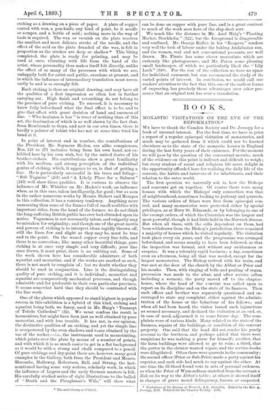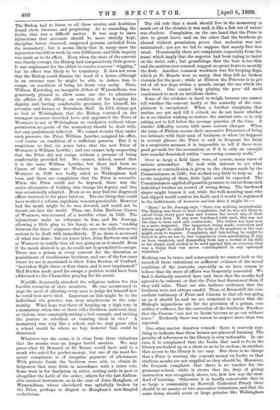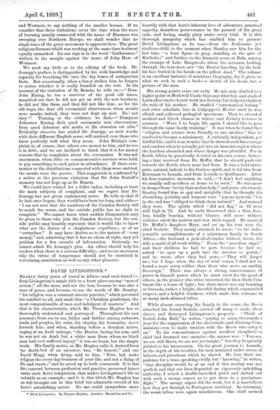BOOKS.
MONASTIC VISITATIONS ON THE EVE OF THE REFORMATION.* WE have to thank the Camden Society and Dr. Jessopp for a book of unusual interest. For the first time, we have in print a report of a regular episcopal visitation of monasteries, and much may be gathered from it which could not be learned elsewhere as to the state of the monastic houses in England during the last forty years of their existence. For the moment we will pass by the question of the conventual morals ; much of the evidence on this point is indirect and difficult to weigh ; but every student of social and religious life must delight in the opportunity afforded here for realising the daily life of the convent, the habits and interests of its inhabitants, and their relation to the outer world.
The first question we naturally ask is, how the Bishops and convents got on together. Of course there were many houses with which the Bishops' only connection was that of neighbourhood, sometimes leading to jealousy and quarrels. The various orders of friars were free from episcopal con- trol, and many monasteries were protected either by special privileges, as at Bury St. Edmunds, or by belonging to one of the exempt orders, of which the Cistercian was the largest and most powerful, though it had little hold in the Norwich diocese. But when all these, with the cells dependent on them, had been withdrawn from the Bishop's jurisdiction, there remained a majority of houses which he visited regularly. The visitation took place every six years, and the programme was arranged beforehand, and seems usually to have been followed, so that the inspection was formal, and without any suddenness or surprise. It was a tolerably rapid business ; a day, sometimes even an afternoon, being all that was needed, except for the largest monasteries. The Bishop arrived with his train, and was met at the door of the church by the Abbot or Prior and his monks. Then, with ringing of bells and pealing of organ, procession was made to the altar, and after service (often including a sermon), the party moved off to the chapter- house, where the head of the convent was called upon to report on its discipline and on the state of its finances. Then each officer and brother was separately questioned and en- couraged to state any complaint, either against the adminis- tration of the house or the behaviour of his fellows ; and when all had been heard, the visitor issued such injunctions as seemed necessary, and declared the visitation at an end, or, in case of need, adjourned it to some future day. The com- plaints were of various kinds. Many related to the state of the
finances, repairs of the buildings, or condition of the convent property. One said that the head did not render his yearly
account to the brethren, and perhaps added that there were suspicions he was making a purse for himself ; another, that the farm buildings were allowed to go to ruin ; a third, that the gutter in the cloister wanted repair, and the service-books
were dilapidated. Often there were quarrels in the community; the second officer (Prior or Sub-Prior) made a party against his superior, and each side had much to say against the other. At
one time the ill-blood found vent in acts of personal rudeness, as when the Prior of Wymondham snatched from the servant a dish on its way to the Abbot's table ; at others it showed itself in charges of grave moral delinquency, known or suspected.
• Visitations of the Diocese of Norwich, A.D. 1492-1539. Edited by the Bey. A. Jessopp, D.D. Printed for the Camden Society. 1E88. The Bishop had to listen to all these stories, and doubtless found them tiresome and perplexing. As to amending the faults, that was a difficult matter. It was easy to issue injunctions that accounts should be more strictly kept, discipline better observed, suspected persons excluded from the monastery ; bat it seems likely that in many cases the injunction was left to work its own fulfilment, and little inquiry was made as to its effect. Even when the state of the convent was clearly corrupt, the Bishop had comparatively little power. It was unpleasant for the abbot to receive a severe " wigging;" but its effect was likely to be transitory. It does not seem that the Bishop could dismiss the head of a house, although in an extreme case he might be able to induce him to resign, on condition of being let down very easily. Thus, William Kyrteling, an incapable Abbot of Wymondham, was generously pleased to allow some one else to administer the affairs of his abbey, on condition of his keeping his dignity, and having comfortable provision for himself, his .servants, and horses, at Downham Hall. In 1514, things got so bad at Walsingham that the Bishop ventured on the strongest measure recorded here, and appointed the Prior of Westacre to act at Walsingham as coadjutor, without whose permission no goods of the monastery should be dealt with, nor any punishment inflicted. We cannot wonder that, under such pressure, the Prior, William Lowthe, resigned his office, —of course on condition of a sufficient pension. But it is suspicious to find, six years later, that the new Prior of Westacre is William Lowthe ; and one cannot help suspecting that the Prior did not resign without a promise of being comfortably provided for. We cannot, indeed, assert that it is the same William Lowthe, but there had been no Canon of that name at Westacre in 1514. Moreover, Westacre in 1520 was badly ruled, as Walsingham had been, and there are complaints that the Prior is sensualis. When the Prior could not be deposed, there was the easier alternative of bidding him change his deputy, and this was occasionally adopted. Even so we may find the disgraced officer restored to his place later on. The one thing that could have worked a reform, expulsion, was not practicable. However bad the monk might be, he was devoted, and could not be thrust out into the world. Thus, one John Barbour, Canon of Westacre, was accused of a horrible crime in 1526. The injunctions make no reference to him, and Dr. Jessopp, allowing a little play to his fancy, or, as he says, " reading between the lines," supposes that the case was held over as too serious to be dealt with immediately. If so, there is no record of what was done ; but six years later, John Barbour was still at Westacre to testify that all was going on as it should. Even if the monk desired to go, he could not be permitted to escape. There was a prison in every convent for the detention or punishment of troublesome brethren, and one of the few cases where its use is mentioned is when John Berdon, of Coxford, " has taken flight three or four times, and is now imprisoned." Had Berdon made good his escape, a petition would have been addressed to the Chancellor praying for his arrest.
Wycliffe frequently attacked the religious orders for this forcible retention of their members. He was accustomed to urge the need of allowing every man to judge for himself how he could best serve God.. Important as this might be to the individual, the practice was most mischievous to the com- munity. What hope was there of keeping up a high tone in a monastery, when two or three older brethren, undevout, lazy, or vicious, were constantly setting a bad example, and inciting the juniors to rebellion or training them in vice? A monastery was very like a school, and we may guess what a school would be where no boy, however bad, could be dismissed.
Whatever was the cause, it is clear from these visitations that the monks were no longer fervid ascetics. We may guess what St. Bernard or St. Bruno would have said to a monk who asked for pocket-money; but one of the most fre- quent complaints is of irregular payment of allowances. With private funds the brethren were able to obtain in- dulgences that were little in accordance with a strict rule. Some went in for dandyism in attire, setting aside in part or altogether the habit of the order ; others for the last fashion- able musical instrument, as in the case of John Hengham, of Wymondham, whose clavichord was spitefully broken by the Prior, perhaps in disgust at Hengham's new-fangled aestheticism.
The old rule that a monk should live in the monastery (n monk out of the cloister, it was said, is like a fish out of water)" was obsolete. Complaints, on the one hand that the Prior is slow to grant leave, and on the other that the brethren go abroad without permission, prove that seclusion was not maintained ; nor are we led to suppose that scanty fare was usual. Occasionally there are complaints (especially from the- rmos) which imply that the superior had been trying to insist on the strict rule ; but gramblinga that the beer is too thin
and the mutton over-roasted, suggest no great desire to mortify the flesh. Another common weakness was for keeping dogs, which at St. Benets were so many, that they left no broken victuals for the poor ; while at Flixton the Prioress is to get rid of all her dogs within a month, except the one which she likes best. One cannot help pitying the poor old maid condemned to such an invidious choice.
Some of the evidence is hard to weigh, because one cannot tell whether the convent laxity or the austerity of the com- plainant is exceptional. When a brother complains that matins are not said till 5 o'clock, we do not know whether he is an idealist wishing to restore the ancient rule, or is only asking not to fall below the average practice of the time. A similar difficulty occurs with more serious charges. When the nuns of Flixton accuse their successive Prioresses of being too intimate with their man of business, or when (as happens- in several places) the Prior is said to frequent the dairy in a suspicious manner, it is impossible to tell if there were• good grounds for the accusation, or if it is only an example how scandal flourished within " narrowing nunnery walls."
Over so large a field there were, of course, many cases of serious misconduct. We look with interest to see what support or contradiction is given to the charges made by the• Commissioners in 1536 ; but we find very little to help us. As to the majority of these, little light could be expected. The Commissioners applied all possible pressure to extort from each individual brother an avowal of wrong-doing. The hardened sinner might brazen it out, while the well-meaning man who had slipped would confess his fault, and it would be registered in the indictment, of however ancient date it might be :—
"Here," as Dr. Jessopp says, "there was nothing inquisitorial. The Bishop was there to hear complaints, but he was not there to• extort from every poor man and woman the secret sins of their hearts and lives. If any were burdened with such, this was not the time to hear such sad confessions. The visitor was here now as a mere inspector. The inspection being made, correction and reform might be called for of the body or its members as the case• might seem to require. Complaints and tale-telling he might be forced to give an ear to, but compulsory cross-questioning of any on bare suspicion, and demanding from any a recital of his falls, or his shame, such recital to be used against him on occasion, that was a thing that was never contemplated in any episcopal visitation."
Nothing can be truer, and consequently we cannot look to the• record of these visitations as sufficient evidence of the moral condition of the convents, especially as we have reason to believe that the state of affairs was frequently concealed. We- find it distinctly asserted here and there that the monks had' agreed to be reticent, or that the Prior had threatened them if they told tales. There are also indirect evidences that the brethren were not always candid. Thus, at Bromehill the con-
cordant testimony of Prior and Canons is that all was going on as it should be, and we are surprised to notice that the Bishop's injunctions are for the provision of a prison, cunt stokkes et cathenis, for the correction of the brethren. Further,. that the Canons " are not to haunt taverns or go out without
leave." Evidently there was reason to suspect more than was reported.
One other matter deserves remark : there is scarcely any- thing to indicate that these houses are places of learning. The paucity of references to the library is very noticeable. In one
case, it is complained that the books that used to be in the library are locked up in a chest so as to be useless ; in another, that access to the library is too easy. But there is no charge
that a Prior is wasting the convent money on books, or that studious monks are not supplied as they should be. Moreover, the frequent complaint that there is no teacher for' the grammar-school, while it shows that the duty of giving instruction was recognised, shows, too, how low was the stan- dard of learning. Otherwise it is hardly conceivable that in so large a community as Norwich Cathedral Priory there should be no master at two successive visitations, and that the same thing should occur at large priories like Walsingham and Westacre, to say nothing of the smaller houses. If we consider that these visitations cover the time when the wave of learning usually connected with the name of Erasmus was sweeping over Northern Europe, we shall wonder that no single trace of the great movement is apparent here. The great religious ferment which was working at the same time is almost equally unmarked. Its one sign is in the word " Lutheranus," written in the margin against the name of John Haw, of Westacre.
We need say little as to the editing of the book. Dr. Jessopp's preface is distinguished by his wide knowledge and capacity for breathing life into the dry bones of antiquarian facts. But occasionally, when a fancy strikes him, he forgets to notice whether it is really founded on the text. In his account of the visitation of St. Benets, he tells us :—" Dom. John Rising, he too a survivor of the good old times, mumbled out that he did not get on with the new brethren, he did not like them, and they did not like him : as for the old ways, the dear old ceremonial observances, when monks were monks indeed, they were not kept up now. No ! not they !" Turning to the evidence, we find,—" Dompnus Johannes Rysing dicit quod ceremonim non observantur. Item quod debentur sibi multa et ille obnoxius eat aliis." Evidently obnoxita has misled Dr. Jessopp, as such words, with their different English sense, will mislead even those who know perfectly well what they mean. John Rising's com- plaint is, of course, that others owe money to him, and he too is in debt ; and we are inclined to think that it is for money reasons that he complains about the ceremonies. It was not uncommon, when obits or commemorative services were held, to pay something to each priest in attendance. If these cere- monies or the distributions connected with them were omitted, the monks were the poorer. This suggestion is confirmed by a notice at the previous visitation that Sir John Fastolf's memory was not kept up at St. Benets.
We could have wished for a fuller index, including at least the main subjects of complaint, and we regret that Dr. Jessopp has not given explanatory notes. He tells us that if he had once begun, they would have been too long, and adds,- " I am not sure that the members of the Camden Society will be much the worse, and the outside public has no right to complain." We cannot know what sudden illumination may be given to those who join the Camden Society, but the out- side public may humbly represent that it would like to know what are the duties of a chaplainess (capellana), or of an " owtrydere." It may have doubts as to the nature of " ceny money," and, admitting that it has no claim of right, may yet petition for a few crumbs of information. Seriously, we cannot admit Dr. Jessopp's plea. An editor should help his readers when there is a serious difficulty ; and we see no reason why the virtue of temperance should not be exercised in restraining annotation as well as any other pleasure.




































 Previous page
Previous page